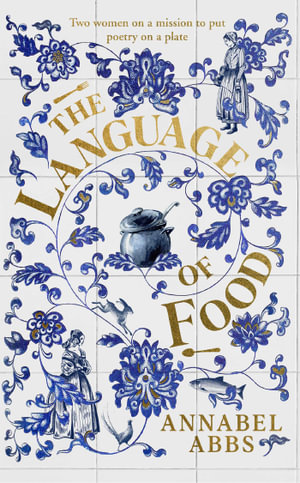In her latest novel, The Language of Food, ANNABEL ABBS brings to life the story of a remarkable woman who went against Victorian conventions to create one of the most memorable English cookbooks.
On a hot sultry Sydney night KAREN WILLIAMS spoke with the author who was awakening to a chilly London day.

Imagine then, a time in England in the 1800s, where there were few to no cookbooks published and those that were didn’t include essential components, such as a listing of ingredients and precise measurements.That would all change with the publication of a cookbook that was so beautifully and poetically written it is still revered by modern day chefs.
Enter Eliza Acton. Her 1845 comprehensive cookbook, Modern Cookery for Private Families, became a phenomenal success, selling well over 100000 copies. Indeed, this is the cookbook that Mrs Beeton is rumoured to have plagiarised at least one third of to use in her own tomes. It is a cookbook that is still in print and treasured by many chefs today – even if some of the ingredients, such as pig’s heads and swan’s eggs, are a little harder to obtain.
Eliza Acton’s fascinating and, to-date, untold story, is the basis for an evocative and beautifully written new historical novel The Language of Food, written by UK author Annabel Abbs. Set in Victorian times during a period of great change, this book will not only awaken your senses, but also your inner chef.
Annabel has penned five previous books, including fiction and non-fiction titles – notably, Windswept: Walking in the steps of remarkable women and the award-winning The Joyce Girl, her debut novel. Australian audiences will have have an opportunity to meet Annabel in May this year when she will be a guest at the Brisbane Writers Festival.
Eliza Acton is an admirable heroine: an unconventional, independent and intelligent ‘spinster’ who aspires to be a poet but who is told by a publisher that ‘poetry is not the business of a lady’.
On what Eliza deems to be the most important day of her life, with the presentation of her work for publication, Mr Longman tells her that romantic novels or a cookbook are more suitable subjects for young women who aspire to write. But Eliza is outraged at the suggestion. ‘I am no aproned household servant’ she muses – before being beset by doubt about her own abilities. ‘I do not – cannot – cook’, says Eliza. To which Mr Longman replies, ‘If you can write poems, you can write recipes.’
It is only when her family’s fortune is lost and she and her mother are forced to open a superior boarding house for upper class society in Tonbridge, that she reconsiders the proposition.
Could she write an accurate collection of recipes which was beautifully written with recipes that ‘speak’, and ‘sang’ to you? Where each dish was recalled on your tongue. ‘Sweet slippery leeks, new born peas swirled in butter, meringue as fresh and light as snow.’ So begins her culinary journey.
But the plot of this book incorporates more than a pinch of spice. There is Eliza’s mother’s constant attention to marrying off her daughter.
‘An old maid has less value than a dob of dirt’, she says to Eliza. ‘Surely you want respect and dignity?’
There is a promising romance, the hint of scandal, and unexpected twists.
The life and times of Victorian England have always had a fascination for writers and readers – from the highs of the wealthy to the extreme destitution and poverty experienced by the lower classes, to what life was like for women.
The story of Eliza’s servant, Ann, and their relationship is integral to the plot and is told in alternate chapters. Here is another heroine who overcomes her circumstances: the tragedy of extreme poverty and the stain of her mother’s insanity, to realise her dream of becoming a cook.
‘Eliza’s and Ann’s relationship must have been pretty special to have lasted a decade,’ Annabel tells me. ‘At this time in history the average servant was employed for about a year and Victorian kitchens were not a very pleasant environment to work in – they were dark and smoky. So there must have been a strong bond and interest to hold them together for well over 10 years.’
With a passion for cooking and a writer’s instinct for story, Annabel shares with me that her interest was piqued when she inherited a collection of old cookery books – including Eliza Acton‘s – from her mother-in-law.
She was intrigued by Eliza’s book, with such elequent writing and, in her research, she soon discovered there was much more to Eliza who seemed to live ‘at the whim of chance’. ‘
The fact that she overcame so many obstacles. She really was carving out her own path. She wanted to live on her own terms during a period when women certainly didn’t have a voice of their own. She’d fallen from a comfortable position to having nothing. She was on that fine edge but she refused to kowtow to it and she successfully published a book in her own name – the latter fact that her mother deemed as ‘ungodly for a lady.’
It took Annabel two years for the novel to take shape. Researching Eliza’s life, cooking and experimenting with the recipes from her original cookbook, The Language of Food brings this brave and independent woman of her times, and her passion for food and poetry, to life. Eliza says, ‘I have started to see poetry in everything – the roughest nub of nutmeg to the pale parsnip seamed with soil.’
Eliza Acton went on to publish a second cookbook, The English Bread Book, and her voice became more outspoken.
As Annabel says, ‘Here was a woman who, if born 60 years later, would definitely have been a suffragette.‘
ABOUT THE AUTHOR
Annabel Abbs is a multi-award-winning writer of fiction and nonfiction. She grew up in Wales and Sussex, with stints in Dorset, Bristol and Hereford. Daughter of academic and poet, Peter Abbs, she has a degree in English Literature from the University of East Anglia and a Masters from the University of Kingston. She lives with her family in London and Sussex, and is a Fellow of the Brown Foundation.
Annabel’s debut novel, The Joyce Girl, won the 2015 Impress Prize for New Writing and the 2015 Spotlight First Novel Award, and was longlisted for the 2015 Caledonia Novel Award, the 2015 Bath Novel Award and the 2016 Waverton Good Read Award.
Her second novel, Frieda: The Originial Lady Chatterley, was a Times Book of the Month, then a Times Book of the Year 2018 and one of five novels selected for presentation to film directors at the 2017 Frankfurt Book Fair.
Annabel’s third novel, the story of Eliza Acton, Britain’s first domestic goddess, and a best-selling cookery book writer (and a poet) was published in the US in October 2021, by William Morrow as Miss Eliza’s English Kitchen. It was selected for Good Housekeeping’s Book Club Pick, Country Living Magazine’s Autumn Pick, the Historical Novel Society’s Editor’s Choice and the New York Times Books‘ Best Historical Fiction for Winter.
Annabel’s first foray into memoir and her first solo-authored non-fiction book, Windswept: Walking in the Footsteps of Remarkable Women was published in June 2021.
In spring 2022, Annabel’s third non-fiction book was published, under the name Annabel Streets: 52 Ways to Walk is an exploration of the lesser-known science behind the simple act of walking.






